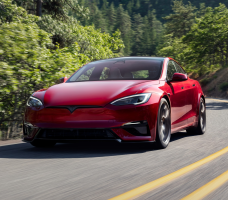
—
A Tesla lawsuit filed in New Jersey claims David W. Dryerman, 54, Michele D. Dryerman 54, and Brooke H. Dryerman, 17, were killed because the Tesla Model S was defective.
The Tesla lawsuit was filed by the Dryerman’s son, Max, who was not in the Model S when it crashed.
According to the initial police report:
“On September 14, 2024, a single motor vehicle crash occurred on the Garden State Parkway in Woodbridge Township, Middlesex County. Preliminary investigation revealed that David W. Dryerman was operating a 2024 Tesla Model S north on the Garden State Parkway. The Dryerman Tesla was occupied by right front seat passenger Michele D. Dryerman and left rear seat passenger Brooke H. Dryerman. In the area of milepost 131.1, the Dryerman Tesla ran off the road to the left, struck a traffic sign support, a metal guide rail end, and a concrete bridge support. All occupants of the Dryerman Tesla sustained fatal injuries as a result of this crash and were pronounced deceased on scene at 0023 hours….” — New Jersey Police Crash Investigation Report
The plaintiff asserts the Tesla Model S was not crashworthy and David Dryerman should have been warned about the limitations of the driver assistance systems.
The lawsuit alleges the Model S did not have the ability to “absorb reasonable collision forces and with adequate occupant protection systems,” something the lawsuit claims “is inexplicable, negligent, reckless, and rendered the vehicle not crashworthy and unreasonably dangerous and defective.”
The Tesla allegedly failed to realize it was going off the road and the car didn’t automatically steer itself back into the driving lane. The lawsuit also asserts there was no warning the Model S was going to slam into the concrete bridge support.
The plaintiff also claims the car shouldn’t have even hit the concrete support if the brakes would have automatically stopped the Model S.
The Dryerman lawsuit also claims all these Model S systems were defective.
- Forward Collision Warning
- Lane Departure Avoidance
- Emergency Lane Departure
- Autosteer
- Obstacle Aware Acceleration
- Acceleration and/or Pedal Misapplication Mitigation
- Side Collision Warning
- Automatic Emergency Braking
Tesla’s Response to Dryerman v. Tesla
In a 21-page response to the Dryerman crash lawsuit, Tesla repeatedly denies claims of wrongdoing or responsibility for the Model S crash and the deaths of the Dryerman family.
According to Tesla, it admits it did equip certain vehicles with driver assistance features referred to as Autopilot, but Tesla argues the suite of features did not render the Model S a “self-driving” car.
Tesla also argues it was not reckless or negligent, and “further denies that its vehicles are not crashworthy and are unreasonably dangerous and defective.”
The automaker also denies it failed to provide adequate warnings about the vehicle and driver assistance systems, and Tesla denies it made any misrepresentations concerning the Dryerman’s Model S. In addition, Tesla insists there were no defects that caused David Dryerman, his wife and his daughter to be killed.
In responding to dozens of allegations in the Dryerman lawsuit, Tesla wrote each time, “Denied.”
According to the lawsuit:
“A practical and feasible alternative design existed that would have reduced or prevented harm and that due to the improperly designed or omitted safer alternative, the product was not reasonably safe as manufactured or sold.”
Tesla’s response to that allegation:
“Denied. Tesla denies that its vehicle or any of its features was defective in any way or that any defects caused or contributed to Plaintiffs’ alleged injuries or claimed damages. Tesla further denies that its vehicle did not conform to the express warranties issued by Tesla. To the extent a further affirmative response is required, Tesla denies the allegations contained in this paragraph.”
Tesla also argues it’s not responsible for the conduct of other parties and cannot be held liable.
“The incident, injuries and damages complained of were caused by the unauthorized, unintended or improper use or misuse, overuse or abuse of the vehicle and Plaintiffs’-decedents’ failure to exercise reasonable and ordinary care, caution or vigilance in the use of said product.” — Tesla
Tesla says it demands a trial by jury.
The Tesla Model S crash lawsuit was filed in the U.S. District Court for the District of New Jersey (Camden Vicinage): Max Dryerman, et al., v Tesla, Inc.
The plaintiffs are represented by Anapol Weiss.
Tesla is represented by Bowman and Brooke LLP.

